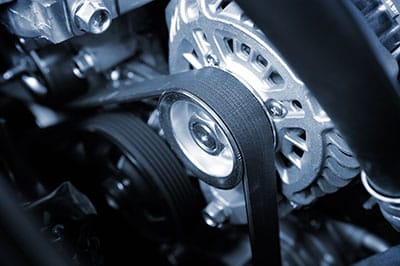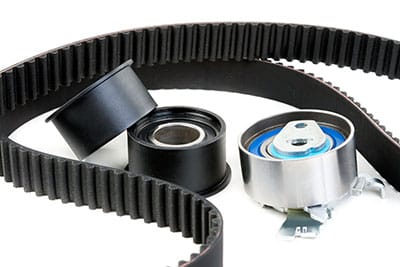Auto Belt Replacement in Portland, OR
Auto Care That Comes to You – Wherever, Whenever!
Get A Free Quote

Auto Belt Replacement in Portland, OR
Car engines may comprise different belt configurations, depending on the make and model of the vehicle. But whatever the type, belts are an essential part of your engine, responsible for driving various components such as the alternator, water pump, power steering pump, and air conditioning compressor. Over time, these belts can wear out and need to be replaced to ensure the engine’s smooth operation.
Three Types of Auto Belts
Serpentine Belt
A serpentine belt is a long, winding belt that loops around many engine components to drive them. Often made of rubber or ethylene propylene diene monomer (EPDM), this belt is the most common type used in modern vehicles. It runs various accessories simultaneously, reducing unnecessary pulleys and increasing efficiency.
Timing Belt
Timing belts are essential for controlling the opening and closing of engine valves. Made of high-quality rubber and reinforced with fiberglass or Kevlar cords, these belts synchronize the crankshaft’s rotation with that of the camshaft(s). The timing belt helps ensure precise valve operation for better fuel economy, lower emissions, and maximum performance.
V-Belts
V-belts, also known as V-ribbed belts or fan belts, are shorter and thicker than serpentine and timing belts. They have a trapezoidal cross-section, allowing them to fit snugly into the sides of the pulleys. This design provides excellent grip for transferring power and is commonly used in older vehicles with multiple accessory components.
Signs You Need to Replace Your Auto Belts
- Squealing Noise: If you hear a high-pitched squealing noise coming from your engine, it could be a sign that your serpentine belt is worn out or loose. This noise is caused by the rubber slipping on the pulleys instead of gripping them properly.
- Visible Damage: Inspect your belts for any signs of damage, such as cracks, fraying, or missing chunks. These are clear indications that your belt needs to be replaced immediately.
- Difficulty Starting: If your car has trouble starting, it could be due to a worn-out timing belt. This can cause the valves to open and close at the wrong time, leading to engine misfires or stalling.
- Overheating: A broken serpentine belt can also cause your engine to overheat, as it is responsible for driving the water pump. When this happens, your car’s temperature gauge will likely show the engine running hotter than usual.

What Are Belt Tensioners
Belt tensioners keep the belts tight and properly aligned on the pulleys. They use a spring-loaded arm or pulley to apply pressure to the belt, ensuring it stays in place while driving. Over time, these tensioners can wear out and need to be replaced along with the belts.
When Should Belts Be Replaced?
The lifespan of auto belts can vary depending on several factors, such as driving habits, climate, and quality of materials used. As a general rule of thumb, serpentine belts should be replaced every 60,000 to 100,000 miles, while timing belts typically need replacement every 90,000 to 100,000 miles. V-belts may need to be replaced more frequently, usually every 25,000 to 50,000 miles.
V-Belt, Timing Belt, and Serpentine Belt Replacement Near Me
Mobile Mechanic Pros of Portland is your go-to mechanic for all auto belt replacement needs. Our team of experienced technicians can quickly and efficiently replace any type of belt in your vehicle, using only high-quality parts. We will come to your location, so you don’t have to wait hours or days before getting your car back on the road.
Contact us today to schedule an appointment!
Next: VW Repair
